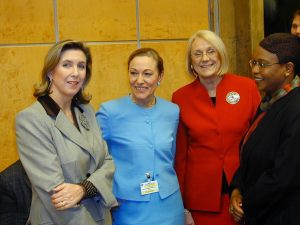The project at a glance
-
Start date:01 Jan 2022
-
Duration in months:48
-
Funding:University of Luxembourg / C²DH / Europe Direct at the University of Luxembourg (ED-UNILU)
-
Principal Investigator(s):Elena DANESCU
About
Research on the role of women in international relations gradually began to enter the historiography from the mid-1970s onwards, firstly focusing on pacifist movements during the Second World War, feminist trends and movements, and human rights, and later with new approaches to international relations theory, gender studies and intersectionality studies. Female leadership in international relations and post-war diplomacy also emerged as a field of study. In Europe, research on these topics began to take shape during the same period, boosted by the introduction of a European gender equality policy. While the principle of equal treatment for men and women was clearly laid down in the 1957 Treaty of Rome (1), it was not until the mid-1970s that a common policy on the economic and social rights of women was pursued. The role of women was first addressed in parity issues, then through women’s accession to and participation in the exercise of political power, gender mainstreaming as a cross-sector approach, gender issues in European integration, female networks and the internationalisation of information and communication technologies. In Luxembourg, research in the field, much of which is conducted by female researchers at the University of Luxembourg, primarily explores the development of women’s rights after the Second World War, “women and gender”, women and democracy and women after the events of 1968. The presence and influence of women in international relations and diplomacy (whether formal or informal – for example the wives of ambassadors serving abroad) is a subject that has received little attention. In this context and given the absence of systematic archive sources (2) , oral history is not only a novel and original source; it is also the most appropriate source to elucidate the role of women in European and international relations in Luxembourg after the Second World War. The aim of this project is to conduct semi-structured filmed interviews with women from a wide range of backgrounds (political, diplomatic, economic, trade union, cultural, technocratic, civil society, etc.) whose action left a mark on European and international relations, then to publish them for the academic community and the general public, in full and as a series of themed excerpts, in the Oral History collection on the CVCE.eu by Uni.lu research infrastructure. The resulting multimedia resources will also be shared with the Historical Archives of the European Union in Florence (HAEU), Archives of the European Parliament and the Jean Monnet Foundation for Europe (Lausanne). _____________________________________________________ 1) See article 119 of the Treaty establishing the European Economic Community (25 March 1957): “Each Member State shall during the first stage ensure and subsequently maintain the application of the principle that men and women should receive equal pay for equal work.” Source: https://eur-lex.europa.eu/legal-content/EN/TXT/?uri=CELEX%3A11992E%2FTXT 2) The diplomatic archives of the Luxembourg Foreign Ministry as deposited in the Luxembourg National Archives (ANLux) only cover the period up to 1973.
Organisation and Partners
- Contemporary European History
- Luxembourg Centre for Contemporary and Digital History (C2DH)
- Historical Archives of the European Union, Florence (HAEU)
- Historical Archives of the European Parliament (HAEP)
- Jean Monnet For Europe Foundation, Lausanne (JMEF)
Project team
- Elena DANESCU, PI
- Francois KLEIN, Project member
- Sascha HELSPER, Project member
- Dr Dieter Schlenker, Project member, Historical Archives of the European Union, Florence (HAEU) (external)
- Dr Katja Seidel, Project member, School of Humanities, University of Westminster (UK) (external)
Photo: Commission des droits de l’homme le 15 et 16 mars 2004 – © Ministère des Affaires étrangères et européennes
